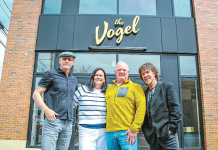By Elizabeth Wulfhorst
New Jersey continues to expand reopenings during Phase Two of the state’s strategic restart after months under a stay-at-home order. But the lasting effects of the COVID-19 pandemic won’t just be felt in the economic loss.
Employees were laid off, businesses closed, in-person education ceased, graduations and other celebrations were canceled or put on hold. In Monmouth County alone, there have been 700 deaths from the coronavirus and over 9,000 positive test results.
“A loss is a loss,” said Alison Block, Ph.D., a licensed psychologist and director of the Health Psychology Center in Oceanport. The loss of anything that is part of a person’s identity is a cause for grief, Block said.
But grieving during a pandemic is very different from the normal grieving process.
“We are conditioned to comfort and reach out” to people who have experienced a loss, said Block. When someone dies, people gather during wakes, Shivas and funeral services to console each other and the remaining family members. “In normal times you have a death and you grieve,” said Block, but now people “can’t gather in a place and hug. They can’t share a meal.” All of which makes the job of a funeral home very difficult.
“Funeral arrangements were always made in person unless somebody lived out of state and couldn’t get home or was out of the country,” a practice made nearly impossible by the quarantine, explained Holly Czarnecki, an administrator at Thompson Memorial Home in Red Bank. Czarnecki recalled the “challenge” they faced when helping people make arrangements in the months during the lockdown.
“We had to do them by the internet, on the phone, and we couldn’t give that personal service which that’s what we’re about,” said Czarnecki. “We are a personal service to families who are suffering.”
Czarnecki said the roughest aspect of the quarantine was not being able to hold ser vices because, “that is par t of saying goodbye to somebody.”
“There were times when you really wanted to cry,” said Czarnecki. “Family couldn’t see their loved one before they went either to the crematory or they got buried, especially in the beginning with everybody so fearful. It was hard. It was very stressful.”
Each change in the rules for gatherings brings a new normal and new stresses for the funeral home industry. With indoor gatherings of more than 10 people no longer banned now limited to 100 people or 25 percent of a building’s capacity more services are resuming at local funeral homes.
Thompson Memorial is taking the same precautions to reduce the spread of COVID-19 as most businesses, following state and medical guidelines, including requiring all those who enter the building to wear face coverings and social distance. Hugs are also off limits “but you can only control so much,” said Czarnecki. “And you always have to remember you’re dealing with people who are at their most emotional.”
And we do have to grieve, said Block. It is a normal response to loss. But the pandemic has thrown “a monkey wrench into the grieving process” and “magnified the isolation we feel around the loss,” Block explained.
So people are trying to find other, unique ways to be together and express their grief. Wakes, Shivas and other types of memorial gatherings give people a chance to talk about the deceased person and remember them, forming a sort of “collective identity,” said Block.
Instead of gathering in person, during the pandemic, mourners are sending letters and emails, sharing stories on social media and holding virtual services online.
While this isn’t the same as physically consoling someone who is suffering, it can still be a valuable tool when dealing with loss.
“It taps into a different, but what can be a good, experience,” Block said. “People are being more reflective, communicating more quietly with themselves and others.”
No matter when or why a loss occurs, there are steps to take to deal with the grief, said Block.
The first step is to identify what you have lost and then “name it,” whether it is a loved one, a job, a celebration or even the feeling of security. “If it stays amorphous, it’s hard to grieve,” said Block.
After naming the loss, Block said, the next step is to “identify what it meant to you” and why it was important in your life: A job gives you a sense of self-worth; a graduation celebrates an achievement, the culmination of hard work.
“Then, even though on a temporary level, we have to try to integrate that loss into our lives and figure out ‘Is there anything we can do to make ourselves feel better?’ ” she said. “Don’t keep fighting” grief, Block said. “If we fight it every day, we become miserable.”
Block also acknowledged that these steps are much harder the more significant the loss, but cautions against putting a timeline on grief.
“Take time to feel emotions,” she said. “It takes ever yone a dif ferent amount of time to grieve.”
The article originally appeared in the June 25 – July 1, 2020 print edition of The Two River Times.














